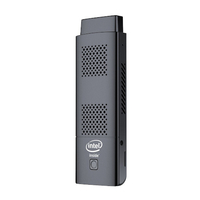This is the cheapest 128GB Windows PC, but it looks like a USB drive
It's barely bigger than a bar of chocolate
XCY M1K PC stick - $159.00 at AliExpress
(£125.01/AU$225.01)
This mini PC from XCY is barely any larger than a chocolate bar, yet it runs on Windows and packs 4GB RAM and 128GB storage. Check out this curiosity for yourself.
XCY appeared on our radar a few weeks ago when it launched a mini PC, similar to the Chuwi LarkBox, that packs 8GB of RAM and a 128GB SSD.
The company has taken the same configuration, tweaked it slightly and placed it in a PC stick called the M1K, which is barely any bigger than a bar of chocolate (similar to the Minisforum S41).
The CPU remains the same: the quad-core, quad-thread Intel Celeron N4100, which still requires an active heatsink fan. The device connects to a monitor via an HDMI port and features two USB 3.0 slots on one side and a microSD on the other, next to a proprietary power-in (which is a bit of a disappointment).
- Check out our list of the best business laptops out there
- We've built a list of the best USB drives available
- Here's our choice of the best business computers around
XCY halved the system memory to 4GB (LPDDR4) and the system storage switched to slower eMMC rather than a SATA-based SSD.
Wi-Fi is handled by the Intel Wireless-AC 7265, which features 802.11ac and Bluetooth 4.2. Other than Windows 10, the only other notable feature is the bundled HDMI adapter cable.
The main issue with this form factor is that fitting it at the back of a monitor is perilous to say the least, given most HDMI ports face the wall, rather than down. On top of that, the M1K's size (135 x 45 x 15mm) means it might prove incompatible with some televisions due to clearance issues.
- Here's our list of the best thin clients out there
Bear in mind
- If this product comes from mainland China, it will take at least a month to reach the UK or US (and potentially more). You may be levied a tax either directly or through the courier.
- If you've managed to get hold of a cheaper product with equivalent specifications, in stock and brand new, let us know and we'll tip our hat to you.
Are you a pro? Subscribe to our newsletter
Sign up to the TechRadar Pro newsletter to get all the top news, opinion, features and guidance your business needs to succeed!

Désiré has been musing and writing about technology during a career spanning four decades. He dabbled in website builders and web hosting when DHTML and frames were in vogue and started narrating about the impact of technology on society just before the start of the Y2K hysteria at the turn of the last millennium.
